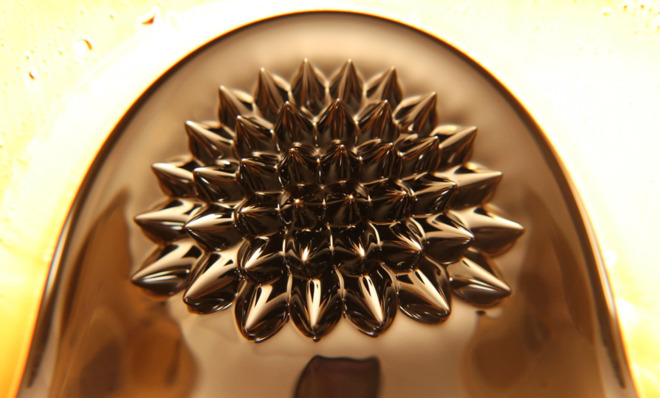This incredible magnetic fluid may be the future of biotechnology
Research suggests ferrofluid can treat tumors, blindness, and more

A free daily email with the biggest news stories of the day – and the best features from TheWeek.com
You are now subscribed
Your newsletter sign-up was successful
This dancing, Flubber-like substance may look like the stuff of science fiction. But it is very real and has some promising scientific applications.
Ferrofluid is composed of iron-containing particles in water or an organic solvent. Magnets are used to manipulate the shape and direction of the fluid. Over the last 50 years, the versatile liquid has found a variety of applications, from loud speakers to intelligent body armor, but new research suggests ferrofluid could also revolutionize medical science. Chris Suprock, an engineer from Suprock Technologies, recently developed a device that uses ferrofluid to mimic the heart's ability to pump blood.
The Week
Escape your echo chamber. Get the facts behind the news, plus analysis from multiple perspectives.

Sign up for The Week's Free Newsletters
From our morning news briefing to a weekly Good News Newsletter, get the best of The Week delivered directly to your inbox.
From our morning news briefing to a weekly Good News Newsletter, get the best of The Week delivered directly to your inbox.
Suprock's team is working on a prototype that will combine several of these devices to make an artificial human heart that doesn't rely on motors or mechanical parts. An elastic membrane uses an electromagnet to stretch and contract the ferrofluid.
As Suprock told New Scientist in 2012:
"Membrane concepts have been explored using pneumatics or hydraulics; however, we are finding that ferrofluid provides more precise control and is more compact. Moreover, the ferrofluid action is electric and can be powered from outside the body without physical contact." [New Scientist]
This control also makes ferrofluid a more precise tool to deliver drugs to localized parts of the body.
Chemotherapy delivers drugs designed to kill cancer cells through the bloodstream. While this treatment can be effective, it can also kill healthy cells and cause immense physical strain on the body. Ferrofluid may be used to direct these drugs to localized areas to treat cancerous cells and tumors, without subjecting the entire body to the strong chemicals used in chemotherapy.
A free daily email with the biggest news stories of the day – and the best features from TheWeek.com
In clinical experiments, researchers Andreas S. Lübbe, Christoph Alexiou, and Christian Bergemann have had some success using magnetic drug targeting to treat tumors and cancerous cells. Their findings are promising but further research is needed. The team has launched a second clinical trial.
"Successful drug targeting with ferrofluids could utilize expensive drugs, those with a short half-life or a high toxicity," the team wrote in a summary of their findings published in The Journal of Surgical Research. "Thus, new innovative or otherwise inadequate therapeutic substances might find a new area of applicability." (The full report can be purchased here.)
Though the use of ferrofluid in drug targeting is the most thoroughly researched area of treatment, scientists are also exploring several other options as well. FerroLabs, a developer and manufacturer of ferrofluid, claims the substance can be used to seal ulcers, treat hyperthermia, and preserve vision.
As Olin Thompson Mefford, a doctor of philosophy in macromolecular science and engineering, writes in a dissertation submitted to Virginia Polytechnic Institute:
Magnetic nanoparticles have been demonstrated to have exceptional properties for MRI contrast enhancement, drug targeting and delivery, hyperthermia treatment, and magnetic separations of bioagents. [Physical Properties of Macromolecule-Metal Oxide Nanoparticle Complexs]
Ferrofluid may also be used to treat retinal detachment, the leading cause of blindness. The treatment, proposed by Mefford, would use ferrofluid to seal tiny retinal holes. The self-sealing nature of the fluid has the potential to treat a variety of fissures too delicate for surgery.
While many of these applications are in the nascent stages of testing, magnetized ferrofluid technology could have serious benefits for medical science.
Monica Nickelsburg is a digital producer for TheWeek.com. She has previously worked for Transient Pictures, The Daily Beast, NBC, and Forbes. Follow her @mnickelsburg.
-
 The ‘ravenous’ demand for Cornish minerals
The ‘ravenous’ demand for Cornish mineralsUnder the Radar Growing need for critical minerals to power tech has intensified ‘appetite’ for lithium, which could be a ‘huge boon’ for local economy
-
 Why are election experts taking Trump’s midterm threats seriously?
Why are election experts taking Trump’s midterm threats seriously?IN THE SPOTLIGHT As the president muses about polling place deployments and a centralized electoral system aimed at one-party control, lawmakers are taking this administration at its word
-
 ‘Restaurateurs have become millionaires’
‘Restaurateurs have become millionaires’Instant Opinion Opinion, comment and editorials of the day